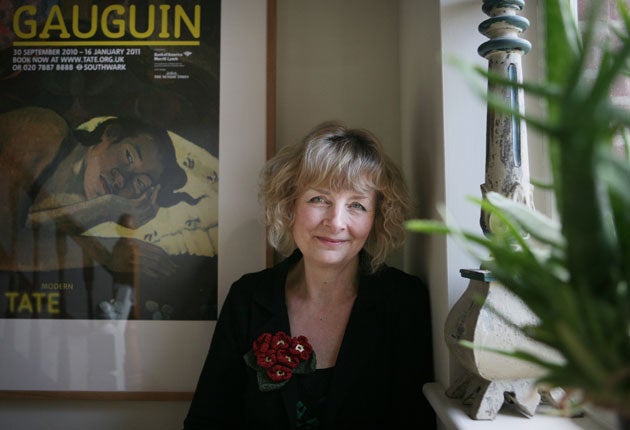Gauguin's British relative disputes artist's notoriety
Painter's great-granddaughter refutes claims of rape, syphilis and paedophilia

To some, he is an artistic genius, the gifted post-Impressionist whose work inspired a generation of painters and sculptors including Picasso; to others he was a wife beater who became a despicable sex tourist, exploiting the Tahitian beauties he painted, before dying of syphilis and alcoholism.
Now a new champion has emerged to defend Paul Gauguin's reputation – his British great-granddaughter.
Mette Gauguin was stung by criticism of him at a recent Tate Modern exhibition. "There were a number of comments about him being a sexual tourist, an exploiter of young women, who had abandoned his children and wife and gone off to exotic lands to enjoy himself. It wasn't like that. I think he was an incredibly brave, courageous man," Ms Gauguin said.
She claims that stories about him have unjustly besmirched his reputation. She denies accusations that he deserted his family to pursue his career as an artist. It was the 1882 stock market crash that forced him out of his job with a Paris broker. The family moved to Copenhagen, his wife's home, where he tried selling tarpaulins. "It was a disaster – he couldn't speak Danish," said his descendant, a print-maker, who came to Britain as a child after the Second World War.
Gauguin's desire for a creative career eventually pushed him to leave Denmark. "He had always been interested in art. But Mette [his wife] saw it more as a hobby," says her namesake. "The in-laws weren't particularly pleasant to him. They thought he was wasting time and not providing for his children. Reading between the lines, they were probably instrumental in the break-up." When he left Copenhagen, Gauguin reportedly said: "I hate the Danes."
At her Oxfordshire home, Mette Gauguin has letters and photographs from other descendants in Denmark, Norway, Tahiti and the Marquesas, islands in French Polynesia. "Gauguin's bottom may have sat in that chair," she says, pointing to a rustic piece which used to belong to her grandfather, Gauguin's son, Pola.
After separating from his wife, Gauguin travelled widely and became a full-time artist. He had always led a peripatetic lifestyle, she says. He was born in Paris, but when he was three he was taken to Peru, where his relatives, a branch of the Borgia clan, included the last Spanish viceroy. "He reckoned he also had savage blood from the Incas," she said.
After a spell at an artists' commune in Brittany and a famous period with his friend Van Gogh in Arles, he spent time in Martinique, and worked on a doomed French bid to build a canal across Panama. Eventually he sailed to Tahiti, where many of his most famous works were painted.
Despite his adventures, he never cut his family off, Ms Gauguin insists: "They wrote to each other for 12 years. A lot of his letters were saying, 'I want you to come out here and be with me.' He gave up the idea of reuniting his family only when his daughter, Aline, died at 18 of pneumonia. She was the one he was most fond of and the one he felt was most affectionate." Gauguin sent his wife canvasses to help provide financially for both himself and the family.
Ms Gauguin insists there is no evidence he raped anyone, or had sex with pre-pubescent children, or gave anyone syphilis. The only evidence that he had the sexual disease is his complaint of sores on his legs, she says. These might have been caused by insects; the artist's wives and children showed no signs of the disease. His cause of death was recorded as a heart attack, not syphilis, she said.
What is undeniable is that he took native wives, a common practice among colonials. And in Tahiti, young women became marriageable as soon as they had passed puberty. "The age of consent in Venezuela and Colombia is 14, and 39 per cent of women in India marry before that age," said Ms Gauguin. "Yet because his wives were 14, he is labelled a paedophile."
Her great-grandfather's sexual exploits were greatly exaggerated,she says. "He was mostly just boasting." It is said that a French missionary tried to stop girls going to Gauguin's home, and that he retaliated by trying to stop them from going to school.
"It's very sniffy of us," said Ms Gauguin. "He wasn't acting against the norm at that time. Whatever the norm is now, it certainly wasn't then."
Genius or sex tourist?
Controversy surrounds Paul Gauguin. Did he desert his family – his sons, Pola and Emile – to fulfil his ambitions? His Reclining Tahitian Women was painted during the last decade of his life in French Polynesia, a time when he took native wives. He died there in 1903, but his great-granddaughter denies he had syphilis
Join our commenting forum
Join thought-provoking conversations, follow other Independent readers and see their replies
Comments
Bookmark popover
Removed from bookmarks